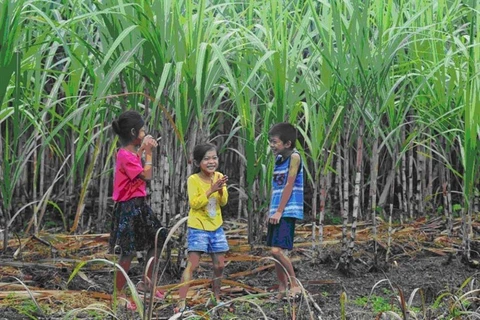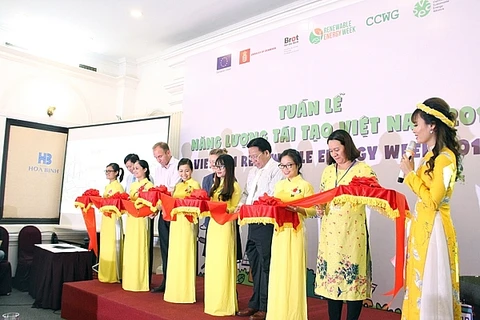 Solar panels at BIM 1 Solar power Plant in Phuoc Minh Commune, Thuan Nam District in the central province of Ninh Thuan (Source: VNA)
Solar panels at BIM 1 Solar power Plant in Phuoc Minh Commune, Thuan Nam District in the central province of Ninh Thuan (Source: VNA)
HCM City (VNA) – Challenges to renewable energy development in Vietnam and solutions to them were highlighted at a seminar held in Ho Chi Minh City on August 23.
The event, entitled “Vietnam Renewable Energy: Challenges and Practical Solutions”, was co-organised by the StoxPlus Corporation and the European Chamber of Commerce (EuroCham) in Vietnam.
Experts said renewable energy development projects are facing challenges in licensing, financing options, and agreements with local project owners.
Nguyen Quang Thuan, CEO of StoxPlus Corporation, said “We would like to share not only market insights and lessons learned from project implementation experience, but also key issues and risks about project development, financing, merger and acquisitions, and equity investment.”
According to Stefano Pellegrino, General Secretary of EuroCham Vietnam, renewable energy development “is more and more important, and EuroCham would like to promote clean and sustainable energy in Vietnam”.
Le Xuan Dong, chief financial officer and director of Business Information Services for StoxPlus, said Prime Minister Nguyen Xuan Phuc issued a decision last year to encourage the development of solar power, and five months later, the Ministry of Industry and Trade issued a circular on the issue, including the feed-in tariff (FiT) rate of 9.35 cents per kWh.
“Foreign and local investors are excited about renewable energy in Vietnam, which is expected to grow at 23.2 percent annually during the 2020-30 period,” he said.
“Despite the rush, out of 24 GW of renewable energy’s registered capacity, only 19 percent have made it to the construction stage, while 8 per cent are in operations. Most projects are still in the preparation stage,” Dong added.
By the end of July, projects with around 12,622MW solar energy capacity were still in the pre-investment stage; 1,432MW in the design and feasibility study stage; 1,002MW (equivalent with 7 percent) in the construction stage; and only 8MW (0.1 percent) in the operating stage.
Wind power projects have become even more difficult to implement than solar energy because of the current low FiT.
“Only 5,700MW of wind power projects are in the stages of pre-investment, design and feasibility studies, construction, or operational stage, much lower than the total MW of solar energy,” he said.
"Biomass uses cheap feedstocks available in the delta regions of the country, including biogases and other agricultural by-products. Hence, there are more biomass projects in construction and in operation,” he said, adding biomass projects are expected to generate about 900MW.
“Because renewable energy is in the nascent stage, developers are encountering challenges from many sides,” Dong said.
He said that the main legal risk comes from the Power Purchase Agreement (PPA), which foreign lenders have deemed unbankable due to its non-negotiability and difficulty in enforcement.
“Even if the PPA is signed, the fixed low FiT could have an impact on profitability and the payback period of the project,” he added. “Local developers also face operational risks such as project delays, overloaded transmission lines in rural areas, and procurement of low quality equipment.”
Current undercapitalisation and low long-term sources of funding make it difficult to borrow from domestic lenders over the long term, he said.-VNA























